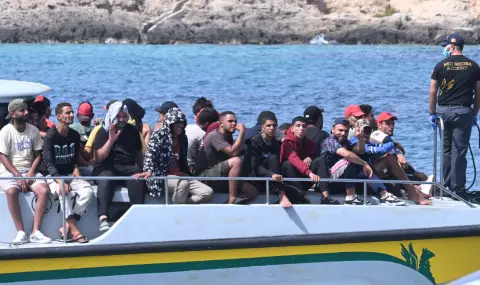The Albanian village of Jadar suddenly attracted the attention of journalists from all over Europe. It became the center of European migration and refugee policy after the refugee camp opened there began to receive asylum seekers from Italy. "These are people who came out of need," local resident Dile Vlashai told DV. Her children are also emigrants - only in Italy. She hopes that the opening of a refugee camp near the village will not cause problems.
2000 people used to live in Jader, during the communist dictatorship there was even a military airport. Today, almost nothing remains of the air base, and the village's population is about 700, mostly elderly people. Almost all young people have gone abroad, from where they send money to their parents, since there is no work in Jadar except for their own fields and yards.
The first 16 migrants have already arrived
After Italy and Albania agreed in November 2023 to build a registration and reception center for refugees on the Adriatic coast in northern Albania, Jadar gained prominence. The first 16 migrants to be accommodated there arrived on the Italian warship "Libra" in the port of Shenzhen, 22 km from Jader, on October 16. Ten are from Bangladesh, the remaining six from Egypt.
They were rescued by the Italian coast guard at sea after their boat left Libyan territorial waters. Four of the refugees were immediately sent to Italy - two minors and two who complained of health problems. The remaining 12 walk the road to the so-called reception center. Journalists are not allowed direct contact with them.
"This is the end of the European dream"
A group of activists is also waiting in front of the reception center with placards reading "This is the end of the European dream". The young people are from the region around Jader, they have been protesting against the construction of the camp for a long time.
In the beginning, their wish was to terminate the agreement between Italy and Albania, and now that the camp is largely ready, they remain against it, but insist on a public discussion with the authorities and security guarantees. "We want our country to guarantee that crime and human trafficking will not increase here,", 29-year-old Marigland Dotsi from Mamuras, a small town halfway to Tirana, told DV.
From the reception center at the port, the refugees head to the Jader camp. It looks like a maximum security prison. The iron walls, several meters high, are covered with gray-green canvases so that one cannot peek inside. The camp consists of container housing and is surrounded by two rows of iron fences. There are also two prison barracks.
Hope for new jobs
The arrival of refugees has been a major topic in Jader for months. Many people say they were skeptical and apprehensive at first. In the meantime, they hope that their village will somehow benefit from the refugee camp, as new jobs are likely to be created. However, people refuse to give their names and categorically refuse to be photographed.
"Some residents had big concerns", says the mayor Alexander Preka, "but they evaporated in view of the income that the construction of the camp brought to the village". Part of the local residents have already found work because of the camp - mainly for its maintenance and cleaning. "This means more development for the district and more prosperity for us," notes Preka. And he adds: "Our door is always open to people in need."
Actually, however, the door to Albania is not open. The agreement between the two countries stipulates that Albania will accept up to 36,000 refugees per year. They will be accommodated in Jader until the Italian side examines their asylum applications. A response must be received within 28 days. If the application is accepted, they will be able to go to Italy. The rest will have to return to their home countries.
Author: Rashela Shehu
